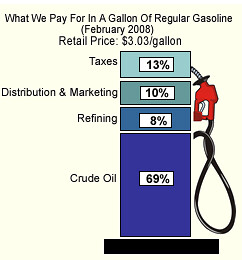Reauthorization and Reorganization in the works for USDOT – House Transportation and Infrastructure Committee Chairman James Oberstar wants to reorganize the U.S. DOT to streamline infrastructure spending programs
(Source: Reuters)
WASHINGTON- The U.S. government would overhaul how it plans and manages big-ticket highway and transit projects in an ambitious proposal being drafted by a senior Democratic lawmaker who oversees transportation.
 House Transportation and Infrastructure Committee Chairman James Oberstar told the Reuters Infrastructure Summit on Tuesday that his plan would reorganize the U.S. Transportation Department in order to streamline infrastructure spending programs.
House Transportation and Infrastructure Committee Chairman James Oberstar told the Reuters Infrastructure Summit on Tuesday that his plan would reorganize the U.S. Transportation Department in order to streamline infrastructure spending programs.
“It’s a complete restructuring of the thought process, the delivery system, the delivery mechanism, and the funding for it,” Oberstar, from Minnesota, said in his Capitol Hill office.
Oberstar’s proposal would be the centerpiece of a six-year highway and transit construction bill Congress will consider this year.
He estimates funding at $450 billion, but the figure has not been finalized. Oberstar, who will manage the highway bill in the House, hopes to propose his plan in the coming weeks.
The Senate is working on its own version.
The Oberstar measure would retain current federal funding sources as well as give more spending discretion to states. In addition, it would make room for private investment in infrastructure programs.
Lawmakers face a September 30 deadline to pass a long-term spending blueprint for new U.S. highway construction, road and bridge repair, and public transit.
That legislation, known as the highway bill, would be separate from the economic stimulus bill passed in February that provides $48.1 billion for transportation.
The current highway/transit construction law was approved in July 2005 with a price tag of $286.4 billion. That amount was considered by many in Congress and industry as inadequate to upgrade the country’s aging transportation infrastructure.
Industry leaders are pressing for the next bill to exceed $500 billion.
Highway spending is funded through a federal trust which draws from taxes on motor fuels. But recent shortages in gas tax receipts due to higher pump prices that have reduced driving and more fuel-efficient vehicles have prompted calls to find alternatives.
Oberstar’s plan would keep the Highway Trust fund, but would allow states to determine their spending priorities.
“They’ve had these responsibilities. They’ve just been straight-jacketed,” Oberstar said about the states. “We’re going to give the states broad discretion.”
Click here to read the entire article.


